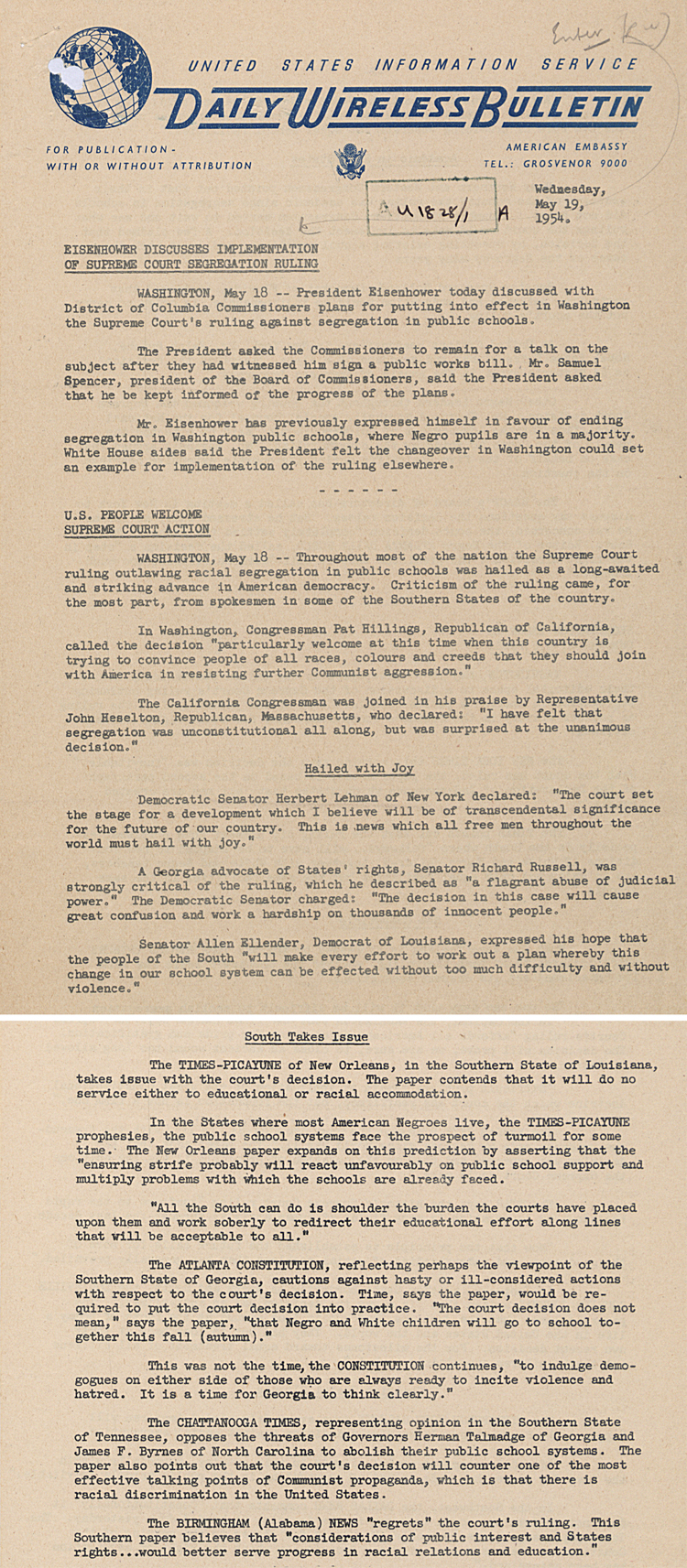
Daily Bulletin from US Embassy in London, 19 May 1954 (FO 371/109162)
Transcript
UNITED STATES INFORMATION SERVICE
DAILY WlRELESS BULLETIN
FOR PUBLICATION –
WITH OR WITHOUT ATTRIBUTION
AMERICAN EMBASSY
TEL.: GROSVENOR 9000
Wednesday, May 19, 1954.
EISENHOWER DISCUSSES IMPLEMENTATION OF SUPREME COURT SEGREGATION RULING
Washington, May 18 – President Eisenhower today discussed with District of Columbia Commissioners plans for putting into effect in Washington the Supreme Court’s ruling against segregation in public schools.
The President asked the Commissioners to remain for a talk on the subject after they had witnessed him sign a public works bill. Mr. Samuel Spencer, president of the board of Commissioners, said the President asked that he be kept informed of the progress of the plans.
Mr. Eisenhower has previously expressed himself in favour of ending segregation in Washington public schools, where Negro pupils are in a majority. White House aides said the President felt the changeover in Washington could set an example for implementation of the ruling elsewhere.
U.S. PEOPLE WELCOME
SUPREME COURT ACTION
WASHINGTON, May 18 – Throughout most of the nation the Supreme Court ruling outlawing racial segregation in public schools was hailed as a long-awaited and striking advance in American democracy. Criticism of the ruling came, for the most part, from spokesmen in some of the Southern States of the country.
In Washington, Congressman Pat Hillings, Republican of California, called the decision “particularly welcome at this time when the country is trying to convince people of all races, colours and creeds that they should join with America in resisting further Communist aggression.”
The California Congressman was joined in his praise by Representative John Heselton, Republican, Massachusetts, who declared: “I have felt that segregation was unconstitutional all along, but was surprised at the unanimous decision.”
Hailed with Joy
Democratic Senator Herbert Lehman of New York declared: “The court set the stage for a development which I believe will be of transcendental significance for the future of our country. This is news which all free men throughout the world must hail with joy.”
A Georgia advocate of States’ rights, Senator Richard Russell, was strongly critical of the ruling, which he described as “a flagrant abuse of judicial power.” The Democratic Senator charged: “The decision in this case will cause great confusion and work a hardship on thousands of innocent people.”
Senator Allen Ellender, Democrat of Louisiana, expressed his hope that the people of the South “will make every effort to work out a plan whereby this change in our school system can be effected without too much difficulty and without violence.”
…
South Takes Issue
The TIMES-PICAYUNE of New Orleans, in the Southern State of Louisiana, takes issue with the court’s decision. The paper contends that it will do no service either to educational or racial accommodation.
In the States where most American Negroes live, the TIMES-PICAYUNE prophesies, the public school systems face the prospect of turmoil for some time. The New Orleans paper expands on this prediction by asserting that the “ensuring strife probably will react unfavourably on public school support and multiply problems with which the schools are already faced.
“All the South can do is shoulder the burden the courts have placed upon them and work soberly to redirect their educational effort along lines that will be acceptable to all.”
The ATLANTA CONSTITUTION, reflecting perhaps the viewpoint of the Southern State of Georgia, cautions against hasty or ill-considered actions with respect to the court’s decision. Time, says the paper, would be required to put the court decision into practice. “The court decision does not mean,” says the paper, “that Negro and White children will go to school together this fall (autumn).”
This was not the time, the CONSTITUTION continues, “to indulge demogogues on either side of those who are always ready to incite violence and hatred. It is a time for Georgia to think clearly.”
The CHATTANOOGA TIMES, representing opinion in the Southern State of Tennessee, opposes the threats of Governors Herman Talmadge of Georgia and James F. Byrnes of North Carolina to abolish their public school systems. The paper also points out that the court’s decision will counter one of the most effective talking points of Communist propaganda, which is that there is racial discrimination in the United States.
The BIRMINGHAM (Alabama) NEWS “regrets” the court’s ruling. This Southern paper believes that “considerations of public interest and States rights…would better serve progress in racial relations and education.”
